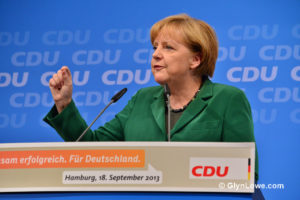New Challenges Arise for Merkel Following Victory at German Elections
 While Chancellor Merkel managed to secure a fourth term, she was also met with an unpleasant surprise on the morning of September 25. Alternative für Deutschland (AFD), a far-right neo-Nazi group, won 12.6 percent of the vote and a seat from 12 out of the 16 German states. This marked the first time that a far-right party has entered the German Parliament since 1949.
While Chancellor Merkel managed to secure a fourth term, she was also met with an unpleasant surprise on the morning of September 25. Alternative für Deutschland (AFD), a far-right neo-Nazi group, won 12.6 percent of the vote and a seat from 12 out of the 16 German states. This marked the first time that a far-right party has entered the German Parliament since 1949.
At the same time, the two centrist parties, the Christian Democratic Union (CDU/CSU) and Social Democrats (SPD) lost 8.6 percent and 5.2 percent of their seats respectively, while AFD gained 7.9 percent. The other clear winner from the evening was the Free Democrats (FDP), a libertarian, pro-business party, who also acquired 5.9 percent more seats.
Now, Chancellor Merkel faces a choice. She could form a strong centrist coalition with the Social Democrats (SDP) with 56 percent of the Bundestag, or she could form a shakier “Jamaica” coalition, which consists of the Free Democrats (FDP) and Greens (Grüne) with 55 percent of the Bundestag and whose name derives from each political party’s symbolic colors that make up the Jamaican flag- black for CSU, yellow for FDP and green for Greens. While the Social Democrats seem like the logical choice as they align more with her political stances, the Jamaica coalition with FDP and Grüne seems to be preferred, as it would leave the Social Democrats as the primary opposition party in place of the AFD.
This decision is further complicated by the fact that a Jamaica coalition would effectively shut out the voices of East Germans who overwhelmingly voted for SDP, AFD, and Die Linke, the left-wing party. Essentially, Merkel must choose how to better combat the rise of nativism and nationalist populism: the stable but oft-bemoaned centrist status quo, or the more ideologically diverse but untested Jamaica coalition?
